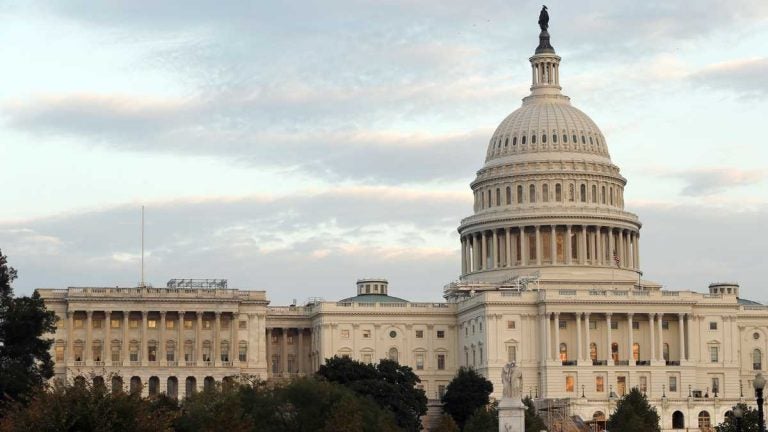Menendez may face choice between voting on health care plan or attending his trial
Listen 2:04
The U.S. Capitol in Washington. (Alex Brandon/AP Photo, file)
U.S. Sen. Bob Menendez may be grappling with a tough choice in the coming days: return to Washington, D.C., for a major vote or sit at the defense table during his own corruption trial.
The possibility is arising for the first time in the federal court proceedings in Newark, which began earlier this month, as Senate Republicans continue fine-tuning their latest pitch to replace the Affordable Care Act.
The most recent iteration, written by Republicans Lindsey Graham of South Carolina and Bill Cassidy of Louisiana, would mean states receive federal block grants to spend on health care as they see fit.
Previous attempts by congressional Republicans to replace the ACA included legislation becoming publicly available just before votes that were scheduled with little notice to lawmakers.
If the Graham-Cassidy bill suddenly comes up for a vote while witnesses are testifying in his corruption trial, Menendez may have to decide where to go: court or the Capitol.
On social media this week, Menendez blasted the Graham-Cassidy proposal, which he said would raise health care costs for the poor and strip millions of their insurance coverage. “ACA helped millions of working Americans by expanding Medicaid & tax
Say NO to the latest Senate GOP assault on your healthcare! NJ is among the states most penalized, so we must rally to #ProtectOurCare pic.twitter.com/nIqXKhQZQ4
— Senator Bob Menendez (@SenatorMenendez) September 19, 2017
But that won’t matter if he stays in New Jersey. “You can announce that you’re opposed to it, but if you’re not there to vote against, it doesn’t count,” said Ross Baker, a political science professor at Rutgers University.
The Democrat voted against previous attempts to topple the ACA, including a push by Senate Republicans in July to pass the “skinny repeal” bill, which failed by a single vote.
Baker said Menendez would likely be there for a critical vote, after mulling over the possible damage caused by the political worst-case scenario: a bill despised by Democrats sails through the Senate while Menendez is 200 miles away.
“If he’s acquitted,” Baker said, “he’s going to have enough to deal with in his re-election [in 2018] without having to defend his absence from a critical vote on Obamacare.”
Spokesman Steven Sandberg said Menendez would consider each bill up for a Senate vote on a case-by-case basis — and weigh whether his vote would have any impact on its passage.
Before the trial began, Menendez’s defense team asked Judge William Walls if he would adjourn the proceedings on days when the Senate was holding major votes, so that Menendez could travel south and participate. Walls denied the request.
“The Court will not serve as concierge to any party or lawyer,” Walls wrote in an Aug. 31 opinion.
He denied that Menendez was facing a unique situation, as his attorneys argued, because the Senate schedule was dictated to him and not the other way around.
“But so are the duties of the radio repairman, the cab driver, and the businessman,” Walls wrote. “Yet none would claim the right to dictate the schedule of their own criminal trial.”
The trial runs through 1 p.m. Wednesday and then resumes its regular schedule next week, which is Monday through Thursday from 9:30 a.m. to 2:30 p.m.
Although criminal defendants are required to be in court for certain parts of their cases, such as their plea and sentencing, they do not have to show up once the trial has begun.
But Daniel Filler, dean of Drexel University’s Thomas R. Kline School of Law, said it benefits defendants to be in court for a number of reasons, including being able to tell their defense attorney about any witness testimony that may be incorrect.
What’s more important, though, is what the jury will think. “It’s never a good sign if the defendant is absent, because jurors will fill in the blanks with all kinds of ideas, almost all of which are negative in some way,” said Filler, who noted that an absence is especially glaring when a defendant has already been attending the trial.
Filler said a defendant’s absence for a day or two may not make a major impression on the jury, but he also cautioned against predicting what jurors might think. Walls has refused to allow the defense team to explain why Menendez is absent — should he skip trial to vote — which could leave jurors scratching their heads.
“It’s not like the jurors think the defendant is off saving lives when they’re not at trial,” Filler said. “Jurors think that a trial is the most important thing happening in any defendant’s life, and a juror’s going to wonder why a defendant isn’t present.”
WHYY is your source for fact-based, in-depth journalism and information. As a nonprofit organization, we rely on financial support from readers like you. Please give today.




